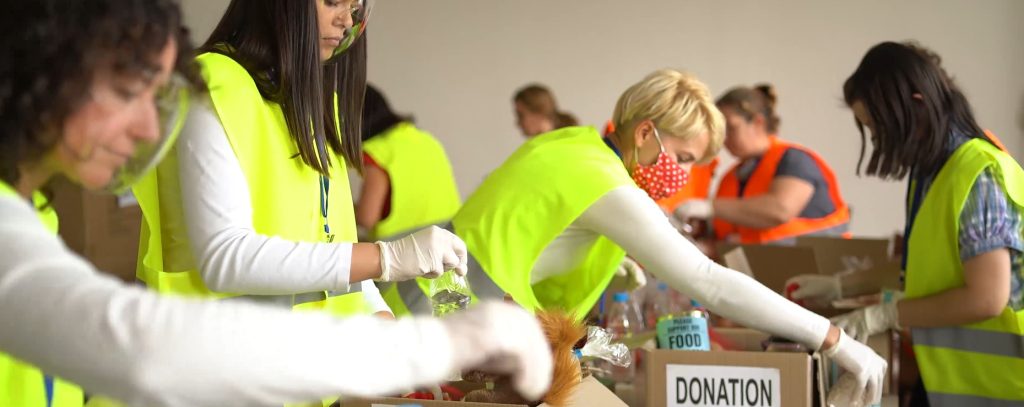Better data, bigger impact
Digital transformation can empower charities to connect with their donors in more meaningful ways, helping to streamline operations, and increase fundraising success
By leveraging technology charities can improve their service delivery, build trust and transparency, develop more targeted marketing initiatives and communications programmes, and better support the day-to-day operations of their in-house teams.
Achieving this requires a strategic approach that combines technology with a commitment to data quality, something Experian has broad experience in supporting charities with. We are acutely aware of the significant benefits data quality can bring, from optimising operations and enhancing donor relationships, of which have a significant positive effect on the cause the charity supports.
The data challenges experienced by charities
In our experience, charities typically face a range of data challenges that can impact their operations, decision-making, and overall effectiveness.
The ability to harness data and insights to improve services and operations
A charity’s ability to fulfill their mission is heavily shaped by day-to-day operational challenges. Many charities are operating on tight budgets, which can limit the funding available to cover operational expenses and implement the strategic programs needed for growth. They must also work relentlessly to retain donors and secure recurring contributions, which is particularly challenging as donor priorities change over time.
Fundraising programmes must be maintainted and developed, while coordinating and managing volunteers is time-consuming. They must decide how to allocate resources across various programs, initiatives, and administrative functions, requiring careful planning and prioritisation against a background of complex regulatory frameworks including tax regulations, reporting requirements, and compliance with non-profit laws.
Addressing these challenges requires a combination of planning, investment in data management tools and technologies, and a commitment to data quality and best practices
Knowing your donors – maintaining supporter loyalty and commitment is critical
Understanding and knowing your donor base is critically important to develop strategies that will retain their support over time. Cultivating donor loyalty by developing personalised interactions and experiences increases the likelihood of long-term commitment. When charities understand their donors’ preferences, interests, and motivations, they can tailor their communication and engagement strategies to resonate more effectively. This approach increases the likelihood of capturing donors’ attention and fostering deeper connections. Charities can align their programs, services, and initiatives with donors’ interests and needs, their preferred way to donate and then design fundraising channels, campaigns and appeals that are more likely to generate positive responses and contributions. Gaining better insights into donors’ giving patterns and motivations also helps charities plan for the future.
Gift Aid – Charities are missing out on millions
Gift Aid allows charities to claim back an additional 25p for every £1 donated by a UK taxpayer, at no extra cost to the donor. It is one of the most important sources of income for charities across the UK and worth £1.3bn a year to the sector. However, according to the Charity Finance Group, more than £500m is unclaimed. This is largely due to the time-consuming administrative steps involved in meeting the eligibility criteria to claim, including being registered with HM Revenue & Customs (HMRC) and having a valid Gift Aid declaration from the donor. Furthermore, Gift Aid claims also require precise donor information (names and addresses) and precise details of the donations made. This relies upon maintaining accurate records of donors across various channels and donation platforms, which can be complex. If there are errors or discrepancies in the data, HMRC may reject the claim.

How can digital transformation empower the charity and non-profit sector?
Charities that prioritise effective data management can address these challenges, gaining valuable data-driven insights, making more informed decisions, and ultimately enhancing their impact on the communities they serve.
Empower and increase fundraising efforts
By harnessing the data they hold on their donors, charities can empower and enhance their funding efforts. This data can inform their strategies, target their outreach, and demonstrate their impact.
- Donor Segmentation: Analyse donor data to segment your donor population based on giving history, interests, demographics, and behaviour. Tailor your fundraising campaigns and appeals to each segment’s preferences, increasing the likelihood of engagement and contributions.
- Predictive Analytics: Use predictive modelling to identify potential high-value donors or supporters who are likely to contribute more. This enables you to focus your efforts on those who are most likely to make significant contributions.
Expand trust and transparency
Digital transformation can play a crucial role in building and enhancing trust with donors for charities. By leveraging technology and digital strategies, charities can demonstrate transparency, accountability, and effective communication, which are essential for fostering trust:
- Real-Time Reporting: provide real-time updates on the impact of donations. Show donors how their contributions are being used and the outcomes achieved.
- Financial Transparency: share detailed financial reports and budgets, showcasing how funds are allocated and demonstrating responsible financial management.
Is social media good for fundraising?
Social media platforms are powerful tools for fundraising, allowing charities and nonprofits to engage with donors, raise awareness, and solicit donations. They reach a diverse audience and inspire support through storytelling, visuals, and real-time updates. Peer-to-peer fundraising is facilitated, enabling supporters to create personal pages and mobilise networks. Targeted advertising reaches broader audiences, while convenient donation features like buttons and fundraisers make contributing easy.
Enhance marketing and communications
Charities can use their donor data strategically to enhance their marketing efforts and build stronger relationships with their supporters. By effectively utilising donor data, you can create more meaningful and relevant marketing campaigns that resonate with supporters, ultimately leading to increased engagement, donor retention, and support for their cause.
- Segmentation: Divide your donor database into segments based on various criteria, such as donation history, giving frequency, donation amount, demographics, interests, and engagement level. Segmenting your donors in this way enables you to create targeted marketing campaigns that resonate with specific donor groups.
- Communication Preferences: Gather data on how donors prefer to be contacted (email, phone, social media) and the type of content they respond to best. This ensures that your communication efforts are well-received.
- Personalisation: Personalise your marketing messages. Address donors by their name, reference their past contributions, and tailor your communication to their interests and preferences. All this will work together to show your donors how much you value their support and maintain their engagement with your cause.
- Customise Content: Use your donor data to understand their interests and motivations. Create content, such as newsletters, emails, and social media posts, that aligns with their values and showcases the impact of their contributions. What’s more, if your donor data is accurate and up to data, you know that it will be delivered through each channel and is not wasted resource.
Support day-to-day operations
Better quality data can significantly improve a charity’s day-to-day operations by enabling more informed decision-making, enhancing communication, streamlining processes, and increasing overall efficiency. Here’s how better data quality can make a positive impact:
- Informed Decision-Making: Accurate and reliable data provides charity leaders and staff with the insights they need to make informed decisions. Whether it’s deciding where to allocate resources, which programs to prioritise, or which fundraising strategies to pursue, high-quality data ensures decisions are based on facts rather than assumptions.
- Targeted Fundraising: With better donor and fundraising data, charities can tailor their fundraising efforts to specific donor segments, leading to more successful campaigns. Donor preferences, giving history, and engagement levels can guide personalized communication and appeals.
How Data Validation Solutions can help
Contact data validation is a crucial aspect of maintaining data accuracy and quality for charities. Ensuring your donor addresses are accurate and up to date is essential for effective communication, fundraising, and program delivery. Having a data validation solution in place will also enable you to make informed decisions, improve donor relationships, streamline operations, and enhance overall efficiency.
Such a solution can be incorporated in real-time into website and online forms, and directly into your CRM system, preventing incomplete or erroneous data from being submitted in the first place, ensuring that donor names and contact details are accurate. This minimises errors in communication, enhances fundraising efforts, and prevents bounced donations.
As mentioned above, this data can then be analysed to achieve a greater understanding of your donors and develop tailored communications that will resonate with them, building a deeper, more meaningful relationship. Furthermore, this helps to maintain up-to-date mailing lists, reducing the chances of sending mail to incorrect or outdated addresses, ensuring that those well-crafted, personalised communications reach the right donors.
This is critical for Gift Aid as it will ensure declarations and donor information are accurate, including names, addresses, and postcodes. Inaccurate or incomplete details can lead to Gift Aid claims being rejected.
Bulk cleanse your existing data
As well as validating data at point of entry, conducting routine bulk data cleansing will ensure all data already in your database is also accurate. Identifying and correcting errors, inconsistencies, and inaccuracies in a large dataset will improve the quality and reliability of your data, which in turn can enhance decision-making, donor relationships, and operational efficiency.
Bulk data cleansing can:
- Standardise data fields such as addresses, phone numbers, and email addresses. This helps maintain consistency and accuracy across the dataset.
- Validate data against trusted sources to ensure accuracy. For example, validate addresses against official postal databases or verify email addresses using email validation services.
- Identify and merge or remove duplicate records. Duplicate entries can lead to confusion, inefficiencies, and inaccurate reporting.
As Gift Aid donations can be claimed for up to 4 years of the end of the financial period you received it in, bulk data cleansing will systematically clean and validate your donor database to ensure accurate and up-to-date information, enabling your charity to make successful Gift Aid claims.
By implementing effective data cleansing and validation practices, charities can ensure that their data remains accurate, reliable, and actionable, leading to improved operations, better decision-making, and stronger relationships with stakeholders.
How can we help?
Better data empowers charities to make a bigger impact by enabling informed decision-making, personalised engagement, and efficient resource allocation. Accurate and up-to-date data helps to identify trends, understand donor behavior, and tailor outreach strategies, leading to more effective fundraising and targeted campaigns.
Experian Data Validation help charities by ensuring data accuracy, reducing errors, and enhancing data quality. This enables charities to build stronger relationships with supporters, make informed decisions, and optimise their operations, ultimately leading to a greater positive influence on their cause.
Get in touch
Speak to one of our experts to help understand how good data underpins every successful charity campaign.
Get in touch








